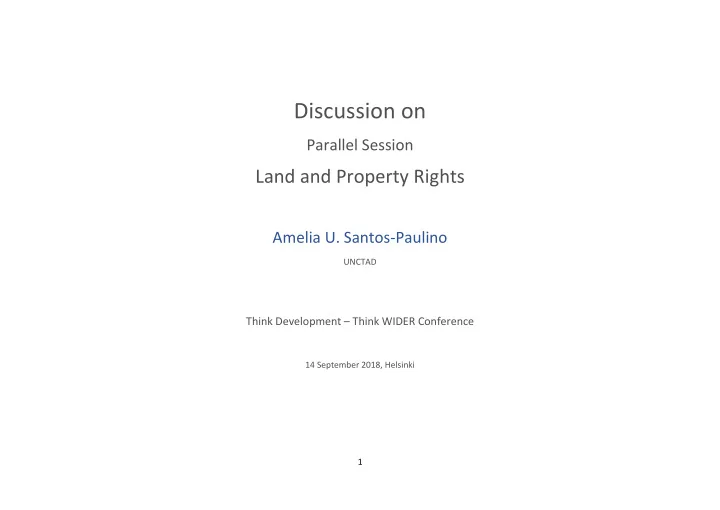

Discussion on Parallel Session Land and Property Rights Amelia U. Santos-Paulino UNCTAD Think Development – Think WIDER Conference 14 September 2018, Helsinki 1
Some background Land and property rights • Around 70% of land in developing countries is unregistered - leaving people more vulnerable to displacement • Globally 32% of farms are held by women, compared with 68% for men • Land issues have played a major role in conflicts in Africa since 1990 Poverty and welfare - Poverty (SDG 1): the poor remain largely rural and dependent on agriculture – even with increasing urbanization (80% in Sub-Saharan Africa), with a high dependency on agricultural work (75% in Sub-Saharan Africa), despite “ structural transformation ” - Out of 161 countries only 37 had specific laws granting equal rights for men and women to own, use and control land (UN commission on the status of Women) - Limited and declining property rights with continued high population growth and limited rural- urban migration opportunities 2
What we understand about property rights - Property rights are not exogenously given - they evolve over time, driven by economic and political forces. HENCE the contributions of the papers in this session are of great importance. - Early redistributions of land led to relatively egalitarian access, and was an important precondition for high growth in East Asia (e.g. Rodrik 1995) - Despite extensive land reforms and improvement in rural property rights, which grant security of access to land and incentives to invest in agriculture (e.g. Deininger et al., 2004), property rights over agricultural land remain persistently incomplete (De Janvry et al, JDE 2014) o The issue is raised for example by the papers today 3
- Insecure property rights over land have multiple ramifications for agriculture and the organization of rural economic activity (Besley and Ghatak 2009, Aryertee and Udry, 2010, Mookherjee Udry, 2014) o The risk that land will be expropriated deters investment. o Reduce the ability of borrowers to pledge land as collateral and thus constrict credit constraints. o Can inhibit land transactions — rentals or sales — and potential gains from trade are lost. o Scarce resources, like labor, may be devoted to protecting one’s insecure rights over plots. 4
General Remarks - The presentations look at different aspects of land tenure security and the findings have important implications for development and policy - Focus on Mexico, Vietnam and selected African countries (Zambia and Rwanda) o The 3 papers use best available data, with well-defined identification and empirical strategies, accounting for household and other time-invariant fixed effects to control for unobserved characteristics o The focus on Mexico, Vietnam and selected African countries provide important lessons for other countries and regions 5
o A common issue highlighted by the 3 presentations is the political implications, particularly the influence of local power hierarchies (or elites) & corruption, of land reforms and enhanced property rights. The presentations raise some important questions 1. What are the persistent challenges for property and land rights, what innovations can be put forward? 2. Ownership structures: individuals vis-à-vis societal property rights (e.g. communal property rights can, under some circumstances, be superior – e.g Platteau, 2000) 3. What about the impacts and spillovers on non-rural / non- farming activities? 4. What are the interactions with other policy areas? 6
Further research and policy questions 1. Impact on structural transformation Land reforms can boost the transition from an economy from agrarian to manufacturing. Thus, it would be useful to consider the impact on non-farming sector (e.g. the number of firms and employment in manufacturing). 2. The impact on investment The importance of agricultural investment for economic development is well recognized, more so in recent years as a result of the ‘food price crises’ in 2007 – 08 (e.g. de Janvry and Sadoulet, 2008). 3. Impact on efficiency: production, food security, etc. 7
4. Gender implications - Land regularization can contribute to improved land access to women, e.g.: o Improved access for legally married women in Rwanda (Ali, Deininger and Goldstein, JDE, 2014). But discrimination remains due to customary laws and culture. o J oint titles are potentially an effective way to improve women’s bargaining power within the household with no associated efficiency losses ( Newman, Tarp, and Van den Broek, LE 2015 ) - But non-farm economy is also important o Non-farm enterprises are less productive when operated by women, located in rural areas, or operated in response to a shock (drought, flood, or illness) – Christiansen et al 2017. 8
5. Impact on human capital accumulation and employment Land reforms in terms of redistribution of land ownership are expected to boost development through an increase in entrepreneurship and human capital stock 6. Institutional innovations (beyond titling) (E.g. Aryeetey and Udry AER 2010) propose a decentralized, private creation of property rights via land banks in Ghana. The shareholders of the land banks would be interested individuals from the community (including chiefs) and elsewhere, and local government. 9
7. Impact of regularization / enhanced property rights on urban areas (e.g. following de Janvry et al, Mexico). 8. Impact of trade (looking at tradables and non-tradables). 9. Role (presence?) of foreign direct investment? And, Data remains an issue! 10
Discussion on Parallel Session Land and Property Rights Amelia U. Santos-Paulino UNCTAD Think Development – Think WIDER Conference 14 September 2018, Helsinki 11
Recommend
More recommend